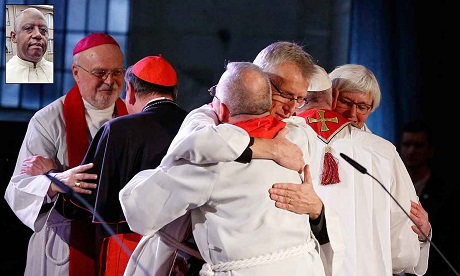A German cardinal known internationally for his ecumenical work died on Sunday.
Cardinal Karl Lehmann, Archbishop Emeritus of Mainz, was a world leader in building bridges of understanding, reconciliation and dialogue.
He played a leading role in advancing the Catholic Church’s ecumenical dialogue, especially with Lutherans and Evangelicals.
German Bishops’ Conference chair, Cardinal Reinhard Marx, said “the church of Germany is bowing humbly in front of a personality who influenced the Catholic church worldwide.”
After learning of Lehmann’s death, German Chancellor Angela Merkel said she was grateful “for our good conversations and meetings over the years.”
She called Lehmann “an exceptionally gifted mediator between the German Catholics and Rome, in the spirit of the economical movement between the Christian churches, but also between Christians and believers of other religions.”
His ecumenical work stretched over 50 years.
In 1969 he became a member of the Central Committee of German Catholics and of a working committee of Evangelical and Catholic Theologians.
Six years later he was named a scientific consultant for the Catholic part of the working committee, and in 1989 became its president.
In June 1983 he became a member of the circle for dialogue between representatives of the German Bishops’ Conference and those from the Council of the Evangelical Church in Germany.
From March 1986-1988, he also became a member and later president of the Lutheran-Catholic dialogue between the World Lutheran Federation and the Pontifical Council for the Promotion of Christian Unity.
Last year the Lutheran and Catholic Churches signed a joint statement to mark their shared commemoration of the 500th anniversary of the Protestant Reformation.
Pope Francis traveled to Lund, Sweden for a joint-commemoration of the landmark anniversary.
In addition to his role in helping advance ecumenism, Lehmann was an academic. He held teaching posts in various German universities.
He received awards from universities and institutions all over the world, and was the author of several publications.
He was elected president of the German Bishops’ Conference in 1987 – a post he held for 20 years.
In 1995 he was named Special Secretary of the First Special Assembly for Europe of the Synod of Bishops, and from 1988-1998 was a member of the Congregation for the Doctrine of the Faith.
Source
